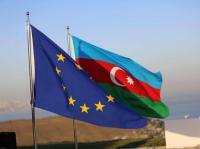Azeri.Today from Washington
EXCLUSIVE
Azeri.Today from Washington
12 July 2017 - 16:18
 2641
2641
 |
Elnur Alakbarov European bureau of Azeri.Today |
Azeri.Today interviews Jack David, a senior fellow at the Hudson Institute think tank of Washington D.C., former U.S. deputy assistant secretary of defense for combating weapons of mass destruction and negotiations policy from 2004-06.

— How do you assess the first meeting of the presidents of the United States and Russia held in Hamburg?
— The Hamburg meeting between presidents Trump and Putin was acceptable from a United States point of view, from a Russian point of view and from an international point of view because it appears in the immediate aftermath of the meeting that no conflict was precipitated and the differences between the United States and Putin’s Russia did not escalate. I don’t believe any profound changes in the relationship between the U.S. and Putin’s Russia will emerge from the meeting because of the basic difference in outlook between the two countries.
— Did the leaders of the two states overcome the tension between the US and Russia?
— No. The tension between the U.S. and Putin’s Russia is a consequence of the difference in outlook between the two countries and is very great but it manifests itself in specific instances and areas of difference. The U.S. views a world order based on differences between countries being resolved politically by reference to rules and norms and not by military force. Rather, the U.S. believes that governments should be required by rules, norms and conventions to respect their own and other peoples’ fundamental rights. This is the international order the U.S. has tried with some considerable success to establish and has supported since the end of World War II. Putin’s Russia, on the other hand, supports a world order where military force can and should determine the outcome of country disputes, a world where “might makes right,” so to speak. Further, Putin’s Russia appears to believe that how a country treats its own people is entirely its own business and that a government’s victimization of its own people should be of little or no concern to others. These differences are reflected in the different positions of the United States and Russia on many issues, including Syria, North Korea, and the South China Sea.
— At the meeting in Hamburg, National Security Adviser McMaster was absent. Does this mean that Trump and Tillerson will have to overcome the resistance of the Congress, as well as other members of the administration of President Trump, the same Defense Minister Mattis and National Security Adviser McMaster who do not want to normalize relations with Russia?
— I don’t know what you mean by “normalize.” I believe that Messrs. Trump, Tillerson, McMaster and Mattis as well as the American people would like to have better relations with Russia. If you are using the word “normalize” to mean “have better relations,” I think that there is no “resistance” in the U.S. to realizing that goal. The main obstacle to the U.S. and Russia having better relations regarding the issues on which they disagree, is the difference in the U.S. outlook described above and shared by most Americans, including Messrs. Trump, Tillerson, McMaster, Mattis and members of Congress, and the outlook of Mr. Putin and the others who help him lead Russia.
— Do you think that Trump will try to force Russia out of the post-Soviet space?
— No. But each time Russia uses force to invade or intimidate a country neighboring Russia in the post-Soviet space, the U.S. and most Americans, will be sympathetic to the invaded or intimidated country and the expressions of anguish of the citizens of the invaded or intimidated country. In such circumstances the U.S. will express its opposition to Russia’s aggression in word and deed. This happened to one extent or another when Russia invaded Georgia in the Bush administration, when Russian supported forces and Russian forces conducted aggressive operations Ukraine, including Crimea, in the Obama administration and when Russia attempted and attempts to intimidate the Baltic countries. So long as Russia continues to use military aggression to conduct its relations with other countries, the U.S. will do what it can to support the victims of the Russian aggression.
— Expansion of NATO and its promotion to the borders of Russia is troubling to Moscow. Will this lead to a military clash between NATO and Russia?
— NATO is a defensive alliance and has no intentions or ability to foment military aggression against any countries that border countries sharing a border with NATO countries, including Russia. However, if Russia engages in military aggression against a NATO member, every NATO member, including the United States, is obliged by Article V of the NATO treaty to act as if the Russian military aggression also is an act of military aggression against itself. If Russia uses military force offensively against a NATO member, it therefore will invite a military clash with NATO and the United States. It is in everyone’s interest that this be avoided. Whether such a clash occurs is totally within Russia’s control.
SOURCE: Azeri.Today
 If you have found a mistake in the text, select it with a mouse and press Ctrl+Enter
If you have found a mistake in the text, select it with a mouse and press Ctrl+Enter
Share
Most read articles

 04 December 2021 - 13:44
04 December 2021 - 13:44